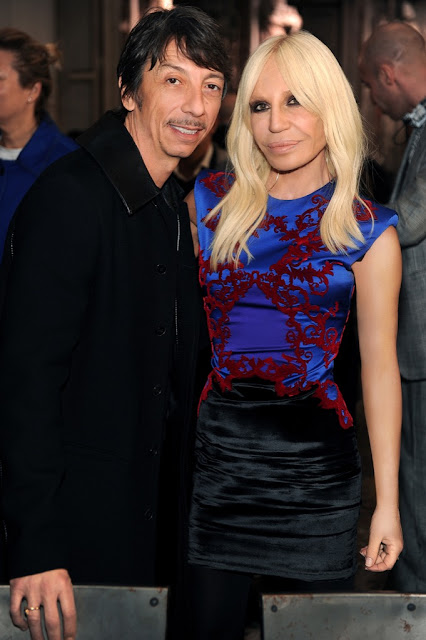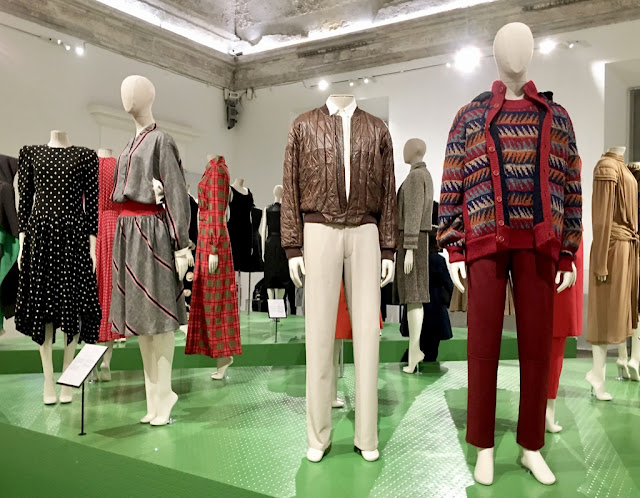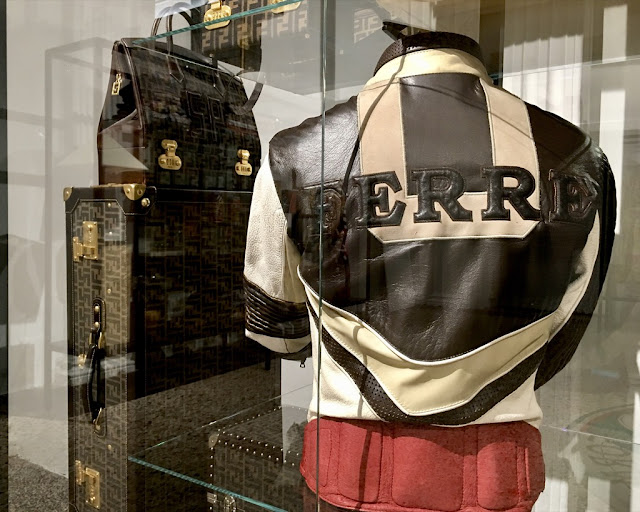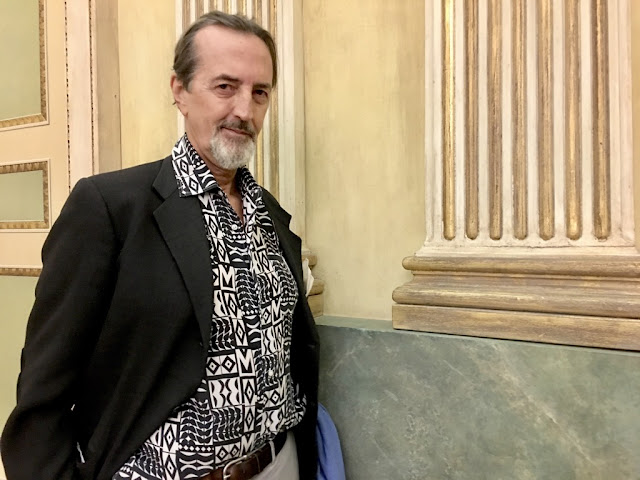Milano Milano – Palazzo Reale
Italiana: Italy Through the Lens of
Fashion, 1971–2001
At Palazzo Reale,
until May 6, Italiana: Italy through the
lens of fashion 1971-2001 is a project in the form of an exhibition and a
book published by Marsilio,
conceived and curated by Maria Luisa
Frisa and Stefano Tonchi. Italiana
celebrates the Italian fashion system over the seminal three decades in which
it cemented relations and exchanges between the members of a generation of designers,
industrialists, artists, architects and intellectuals that defined Italy’s image in the world and put it
on the map of international culture.
Gucci – Tom Ford – 1996-1997
pinstripe and red velvet - his and hers trouser suits
L’Uomo Vogue - “ Unilook - Lui e Lei alla Stessa Maniera”
photograhs - Oliveiro
Toscani – December 1971
“This exhibition recounts the
evolution not just of fashion but also of Italian society over the period from
1971 to 2001.”
Domenico Piraina - Director of Palazzo Reale
Domenico Piraina - Director of Palazzo Reale
Curators Stefano Tonchi and Maria Luisa Frisa,
Carlo Capasa Domenico Piraina
Photograph by Francesco De Luca – courtesy Karla Otto
Milan
Diorama Room
A
diorama reconstructs a Wunderkammer,
exalting and celebrating the virtuoso and perilous relations between objects of
fashion and objects of design. It evokes the eclectic and metaphysical
landscapes-often the result of the visionary imagination of Occhiomagico and Studio Alchimia, which inhabited the covers and pages of Domus and Domus Moda, the supplement launched by Alessandro Mendini in 1981 to introduce fashion into the debate
over the Italian culture of design.
Cinzia Ruggeri – dress with leds
– 1982
Gaetano Pesce – Dalilatre for
Cassina
Ettore
Sottsass – Ultrafragola for Poltronova 1970-2018
Krizia – pleated jumpsuit –
1981-1982
Archizoom Associati – Mies-Poltrona
for Poltronova -1970-2018
Pietro Chiesa – Luminator for
Fontana Arte
Gianfranco Ferre – Fall/Winter
1988-1989
Bo-Bo Kaminsky (stilisti David Mantej and Evelina Barilli) – Fall/Winter 1984-1985
Gianni Versace – Spring/Summer
1992
Italiana is an adjective, used here as a noun to indicate
the complex set of traits, styles and atmospheres that define Italian culture
in all its forms and expressions. The subtitle Italy through the Lens of Fashion—which in Italian, L’Italia vista
dalla moda (literally “Italy as Seen from Fashion”), evokes “The Earth as Seen from the Moon,” Pier Paolo Pasolini’s episode of the
film The Witches (1967) which presents
fashion as the point of view privileged by the narration and the asserts and
the need to take a new critical approach.
Pierpaolo Piccioli and Donatella
Versace
Gulp – 1978 c. – Walter Albini -1981
Giorgio Armani - Fall/Winter 1991-1992
Missoni – Fall/Winter 1991- 1992
The year 1971 symbolically marks the
break with high fashion and the beginning of the period of Italian
ready-to-wear: it was the year in which Walter
Albini chose Milan for the first
show of the line that bore his name, the so-called “unified collection.” And it
was the year in which the women’s liberation movement emerged in Italy. The date 2001 is one of
emblematic closure — the following year, after making its debut on financial
markets in 1999, the Euro would enter into circulation.
Photograph courtesy Karla Otto Milan
Oliviero Toscani and Rosita Missoni
Francesco Vezzoli - Self-Portrait with Vera Lehndorff as
Veruschka and Gianpaolo Barbieri – 2001
Photograph courtesy Karla Otto Milan
Francesco Vezzoli,
Miuccia Prada and Stefano Tonchi
Giorgio Armani – Fall/Winter – 1993-1994
Gianni Versace – Spring/Summer - 1982
Giorgio Armani - Fall/Winter – 1986-1987
Photograph courtesy Karla Otto Milan
“Mine is not a mannish
woman. She is simply a woman who has adopted the intelligent and functional
formulas of male attire. Not because she wants to look like a man, but because
at eight o’clock in the morning, with an hour to get dressed and washed, it’s
nice to know that with a jacket, a shirt and a pair of pants the problem is
solved.”
Giorgio Armani – 1980
Photograph by Francesco De Luca – courtesy Karla Otto
Milan

Project Room
The surface of the industrial
workbench is turned into a showcase to focus attention on fashion as a designed
object. The horizontality of the bench is mirrored in the vertical display cabinets
on the walls: the more experimental items of knitwear and clothing are laid out
flat to emphasize the qualities of their construction and their graphic
designs. From the avant-garde experiences of Archizoom Associati's dressing design and the experimental research
of Nanni Strada to the decorative
tours-de-force of innovative knitwear, represented by examples of excellence
like Pour Toi, Missoni, Krizia and Fuzzi. The unprecedented juxtaposition
of these items forms a landscape that reveals a still little-known quality of Italian fashion design.
Photograph courtesy Karla Otto Milan
Dean Caten, Neil
Barrett and Dan Caten
Enrico Coveri – Spring/Summer – 1985
Alighiero Boetti – Tutto – embroidered wall art - 1992-1994
Versace (creative director Donatella Versace)
Fall/Winter 2000-2001
Gucci (creative director Tom Ford) – Spring/Summer – 1999
Photograph courtesy Karla Otto Milan
Jean Paul Gaultier
Etro – Spring/Summer – 1995
Salvatore Ferragamo - Spring/Summer – 1999
Gianni Versace – Spring/Summer 1993
Pucci – Spring/Summer 1992
Versace (creative director Donatella Versace) – Spring/Summer 2000
Valentino – 1972
Maurizio Cattelan – Il Bel
Paese – carpet - 1994
Photograph courtesy Karla Otto Milan
Laudomia Pucci
Fendi – Zucca handbag and suitcases (belonging to Sophia Loren) 1970s
Gianfranco Ferre – Fall/Winter – 1993-1994
Gianfranco Ferre – Fall/Winter – 1992-1993
Krizia - Fall/Winter – 1981-1982
Franco Moschino – 1992
Giulio Paolini – Casa di
Lucrezio – sculpture - 1981
Franco Moschino – Spring/Summer 1993
Giovanni Gastel
Giorgio Armani – Fall/Winter 1981-1982
Romeo Gigli – Fall/Winter- 1989-1990
Dolce e Gabbana – Spring/Summer 1992
Gianfranco Ferre – Fall/Winter – 1987-1988
Fiorucci – 1970s



























